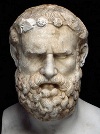I think of him as the anti-Homer poet. While Homer’s subjects are gods and heroes, Archilochus writes of drunkenness, running away to live and perhaps fight another day, the common man with his feet planted firmly on the ground — and, occasionally of sweet love. Not much is known about him other than that he was alive sometime during the mid-7th century BCE. The italicized introductions are mine; the translations are from this Bernard Knox edition.

On drinking:
And I know how to lead off
The sprightly dance
Of the Lord Dionysus,
The dithyramb.
I do it thunderstruck
With wine.
And:
Kindly pass the cup down the deck
And keep it coming from the barrel,
Good red wine, and don’t stir up the dregs,
And don’t think why we shouldn’t be,
More than any other, drunk on guard duty.
On getting even:
One sizable thing I do know:
How to get back my own
With a man doing me wrong.
On the salt of the earth:
I don’t like the towering captain with the spraddly length of leg,
One who swaggers in his lovelocks and cleanshaves beneath the chin.
Give me a man short and squarely set upon his legs, a man
Full of heart, not to be shaken from the place he plants his feet.
On running away to survive:
Some barbarian is waving my shield, since I was obliged to
leave that perfectly good piece of equipment behind
under a bush. But I got away, so what does it matter?
Let the shield go; I can buy another one equally good.
On foxes and hedgehogs:
The fox knows many tricks, the hedgehog only one.
One good one.
Then, surprisingly, love:
O that I might but touch
Neobulé’s hand.

(This is the same Archilochus of whom Heraclitus said, “Homer deserves to be thrown out of the contests and flogged, and Archilochus too.” But that is another story.)

(Nietzsche too mentions Archilochus in Section 5 of The Birth of Tragedy, interpreting him as Dionysos’ vehicle. But that too is another story. Now kindly pass the cup down the deck.)
Related: This series of short commentaries on key works in art history, by Alexandros, Michelangelo, Brunelleschi, and others.
.
Archilochus, in mutability
Not always militant, drank amiably.
Good one.
Hello Mr. Hicks
Archiloque – Fragments – Édition Les Belles Lettres, is my bedside book. For me he is the greatest poet I know.
If you read French, I recommend it. Apart from the introduction, all the fragments are translated into Greek, if you read Greek, with all the comments.
Here: https://www.lesbelleslettres.com/contributeur/archiloque
Best and happy new year!
Les Belles Lettres – Archiloque : (traduction Google Translate) : “Our edition brings together in one volume not only the testimonies on the poet and the fragments of Archilochus, but also the testimonies on the poet and the doubtful or apocryphal fragments. The introduction takes stock of the knowledge relating to the life and chronology of Archilochus, in particular the problems linked to the dating of an author that critics cannot place more precisely than between the middle of the 8th century and the middle of the 7th. The dialects used by the poet, as well as the metrics, are analyzed in detail while judicious reading paths are suggested. The text, fragmentary, is illuminated by a rich commentary. The work is also enriched with a glossary as well as a table of concordance between the different editions.”
Thank you, Nicolas.